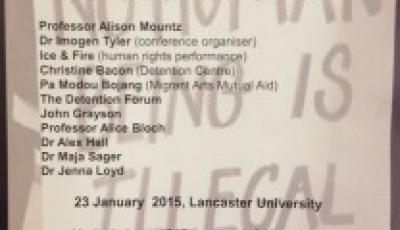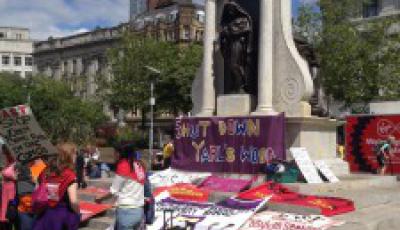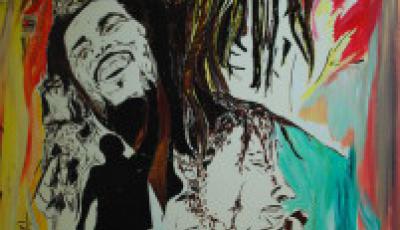Post by Sarah Turnbull, Centre for Criminology, University of Oxford

The conference opened on the evening of 22 January with a public lecture by Dr Alison Mountz, Professor of Geography and Canada Research Chair in Global Migration, Wilfrid Laurier University. Mountz’s presentation, ‘The Business of Detention, the Death of Asylum, and the Life of Activism,’ explored the complicated terrain of detention globally with specific focus on islands as unique sites of confinement. Her talk drew attention to the vast array of business interests in the global detention industry, including governments, private companies, and NGOs. Mountz presented data from a research project that explored migrants’ journeys, their experiences of detention on islands, and practices of activism and resistance. Following Mountz’s presentation, a public performance of the ‘Asylum Monologues’ was staged by Ice & Fire. This performance provided first-hand testimonies of the UK’s asylum system in the words of those who’ve experienced it.
On 23 January, the conference opened with welcomes from Tyler and Professor John Urry, Director of CeMoRe, and powerful songs by members of the Women Asylum Seekers Together (WAST) choir. The day was divided into two sessions, ‘Activisms In and Around Detention’ and ‘Research as Resistance,’ and concluded with a keynote address by Dr Jenna Loyd, University of Wisconsin.
Session 1: Activisms In and Around Detention
Speakers in the conference’s first session were Christine Bacon, Artistic Director of Ice & Fire; members of WAST; Pa Modou Bojang (Prince) of Liverpool’s Migrant Artists Mutual Aid (MaMa); Eiri Ohtani, Co-ordinator of The Detention Forum; and John Grayson, activist and independent researcher with the South Yorkshire Migration and Asylum Action Group.
Bacon spoke briefly about her previous research on the role of private companies in making the UK’s detention estate what it is today before turning to her current work with Ice & Fire as a means to reach out to the ‘uninitiated’ through human rights performance art. She spoke of the role of Ice & Fire in training and education for Home Office staff as well as medical students about the challenges facing asylum seekers in the UK.

Prince shared his experience of the UK immigration and detention systems and his work in broadcasting as a way to connect to others, share information, and push for political change. His story highlighted some of the challenges of the immigration system for migrants including the cost of legal representation, wait times, and finding suitable accommodation and employment.
Ohtani’s presentation explored the question: why doesn’t immigration detention end? Asking how the system ‘works,’ she offered a critical examination of the various players involved in the detention ‘industry,’ a list including the likes government and private companies to NGOs and academics. Ohtani noted the absence of migrant voices in most of the writing and research about detention, and underscored the important relationship between knowledge and social change. This presentation encouraged critical self-reflection on the part of academics researching this area and the role we play in the detention industry.
In the session’s final presentation, Grayson focused on asylum housing in the UK as ‘soft detention,’ and an under-researched aspect of the detention system. He explained the big business of asylum housing and the involvement of key operators G4S and Serco in a £1.8 billion contract started in 2012. Grayson highlighted asylum seekers’ experiences of indignity and lack of respect, as well as the gendered impact on women with children and pregnant women.
Session 2: Research as Resistance
Speakers for the day’s second session were Professor Alice Bloch, Manchester University; Dr Maja Sager, Lancaster University and Lund University; Professor Gillian Whitlock, University of Queensland, Australia; and myself. Unfortunately Dr Alex Hall, York University, was unable to attend.
Bloch presented research findings of her study of the strategies used by undocumented migrants in London to stay hidden from the gaze of the state. Of interest were the ways in which these migrants managed ‘illegality’ on a day-to-day basis, including how and if they worked, where they lived, and how they spent their time. Bloch found that undocumented migrants used a variety of strategies to manage precarious and often exploitive conditions of work. They lived with the ever-present threat of raids, both at home and in their places of employment, with some isolating themselves as a safety strategy.
In the next presentation, Sager examined the ‘continuum of constrained mobility’ experienced by asylum seekers in the UK. She noted that upon claiming asylum and becoming ‘asylum seekers,’ these individuals are subjected to a variety of mechanisms of constraint, including destitution, detention, and deportation. Sager discussed participants’ techniques for reducing the burden of these constraints, such as community building and developing systems of mutual support with others.
Whitlock’s presentation focused on the testimonies of migrants who experienced enforced ‘tow backs’ by the Australian Navy through its ‘zone of exclusion’ and captured the event on their smart phones. The footage was later broadcast on ABC in Australia. Whitlock discusses how the video documentation of the tow back policy in action enabled the creation of a testimonial narrative showing the embodied experience of the expulsion, one characterised by suffering, shame, and anger, yet reflective of agency and subjectivity.

Share:








